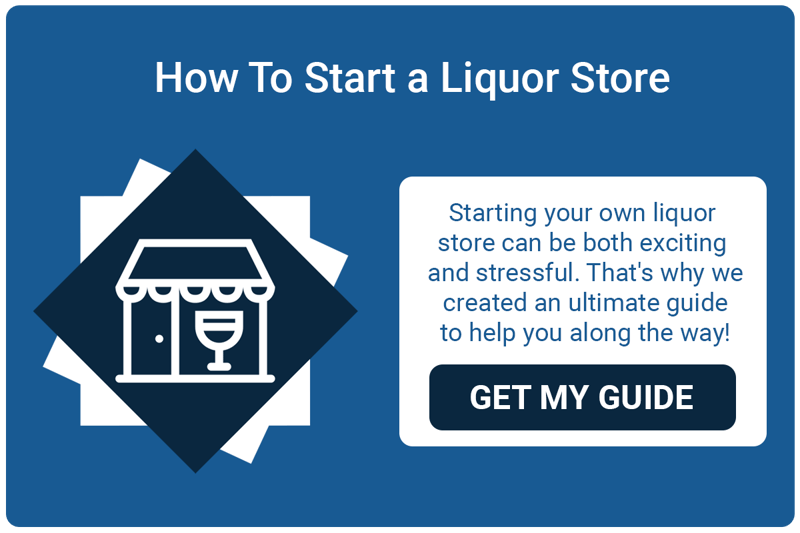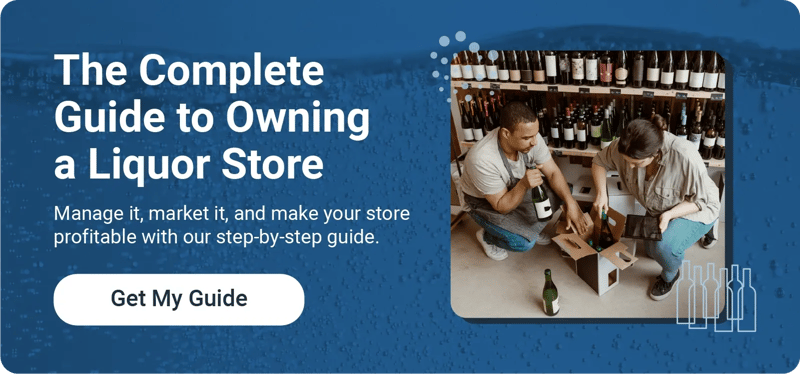Launching a liquor store is an all-consuming project. You have to secure a liquor license, find the perfect location, invest in inventory, and search for reliable staff.
With all these tasks on your to-do list, it might be tempting to skip the business plan.
But creating a liquor store business plan is more than a formality; it’s your roadmap to success, outlining how you’ll tackle the unique challenges of the liquor industry and achieve steady growth.
In this blog, we’ll share five of the most common mistakes new liquor store owners make during the planning process — plus what to do instead.

1. Skipping Market Research
Market research is more than a buzzword; it’s an essential part of a comprehensive liquor store business plan.
Market research involves identifying your ideal customer and designing your liquor store to meet their unique wants and needs. This ideal customer’s profile should inform your stocking, pricing, and marketing strategies.
Without proper market research, you’ll struggle to stand out from the competition and build a committed customer base — causing your liquor store’s success to fizzle over time.
What To Do Instead
Fortunately, market research doesn’t have to be complicated. Let’s break it down into three simple steps.
- Identify and learn about your customers: Is your neighborhood home to young professionals on a budget, or older residents with extra money to spend on fine spirits?
- Size up the competition: Visit other local liquor stores and take note of their products, prices, and shopping experience. Identify what they do well and where they could improve.
- Find your niche: Combine what you learned about your customers and competitors to identify your liquor store’s unique value proposition. Your business should fill a specific gap in the market.
Let’s look at an example and say you live in a growing neighborhood with a new influx of high-income residents. Existing liquor stores nearby offer popular brands at low prices, but no luxury options.
In this case, your value proposition might be to offer fine spirits and rare wines. Customers can visit your liquor store to find bottles they can’t get anywhere else — and they’ll be willing to pay a premium for access to your curated selection.
2. Not Making an Inventory Management Plan
Inventory management is one of the toughest parts of owning a liquor store, requiring you to strike a delicate balance between overstocking and understocking.
You'll lose sales and disappoint customers if you run out of your bestselling spirits. If you overstock your less popular bottles, you’ll run into storage and cash flow issues.
That’s why your liquor store business plan should include a thorough overview of how you plan to track stock levels, forecast your inventory needs, and stock your shelves with the right bottles.
What To Do Instead
The easiest way to manage your liquor store’s inventory is to invest in the right tools. Specifically, you need a point of sale (POS) system with built-in liquor inventory management features. Here’s what to look for:
- Real-time inventory tracking lets you see your stock levels at any time, from anywhere.
- Case breaking lets you track and sell inventory by the full case or individual bottle.
- Automated purchase order creation and receiving makes it easy to restock your shelves.
- Shrinkage monitoring shows how breakage and theft affect your bottom line.
Relying on inventory management software eliminates time-consuming and error-prone manual stock counts, making it a breeze to keep your liquor store’s shelves perfectly stocked.
3. Cutting Corners on Liquor Law Compliance
The liquor industry is tightly regulated, and failing to abide by these regulations can lead to hefty fines or even the loss of your liquor license.
Your liquor store business plan should include a detailed analysis of your state’s liquor laws and how you plan to comply with them.
What To Do Instead
First, thoroughly research your area’s liquor laws. All states prohibit selling alcohol to customers under 21, but other states and counties have specific laws about maintaining inventory records, limiting operating hours, or securing a location far from schools and churches.
Once you understand the laws, make a plan to comply with them.
Age verification is one of the toughest compliance tasks, so we recommend investing in an ID scanner. This tool speeds up the checkout process and makes protecting your liquor license and customers easier.
4. Ignoring the Importance of Marketing
Even if you have the widest selection of spirits, most attractive displays, and friendliest cashiers in the neighborhood, you still might struggle to attract customers.
That’s where marketing comes in.
Without a marketing plan, you’ll have no way to spread awareness about your liquor store and connect with potential customers — which significantly limits your sales potential.
What To Do Instead
Crafting a liquor store marketing plan might sound intimidating, so let’s break it down into two simple goals: attracting and retaining customers.
First, let’s talk about attracting customers. Here are some proven strategies to try.
- Build your online presence: Claim your Google Business Profile and add your address, hours, and phone number to help potential customers find and learn about your store.
- Embrace e-commerce: Consider launching an online liquor store to expand your reach, make it easier for potential customers to find your store, and boost your revenue.
- Host events: Partner with local distilleries and breweries, plan tastings, or host local entertainers to bring new customers into your store.
Once you’ve brought a shopper through your door, you should focus on turning them into a loyal customer. Here’s how to do it.
- Launch a loyalty program: Encourage customers to choose your store for all their liquor needs by rewarding them every time they shop with you.
- Offer enticing promotions: Use discounts to delight customers and increase your revenue. Experiment with bundle deals, flash sales, and seasonal promotions.
- Improve your in-store experience: Win customers over by consistently providing an excellent experience every time they visit your liquor store. Design attractive displays, train your staff, and invest in a modern POS system to make shopping with you a breeze.
These tips will help you build and grow a dedicated customer base.

5. Cheaping Out on a POS System
Choosing a POS system at random is another mistake to avoid when creating your liquor store business plan.
You might think of a POS system as a simple cash register, but this powerful tool is critical for your liquor store’s day-to-day operations. Along with processing transactions, it can track your stock levels, verify customer ages at checkout, monitor your sales trends, and even help you launch marketing campaigns.
Without these helpful features, you’ll have to set aside valuable time for manual tasks like stock counts and sales reporting.
What To Do Instead
While opting for basic or free POS software might sound like a smart option, these solutions will hold your business back.
That’s why we recommend relying on a liquor-specific POS solution from day one. Look for one that includes liquor inventory tracking features, built-in age verification, marketing tools like a customer loyalty program, and advanced sales reporting.
These features will save you time and help you implement your inventory management, legal compliance, and marketing plans,
Related read: 5 Reasons to Use a Liquor POS System [+ Top Providers]
Execute Your Liquor Store Business Plan With Bottle POS
Once you’ve created your business plan, you need the right tools to run your store well. The right POS system can turn your liquor store dreams into a reality.
Bottle POS is an all-in-one POS solution designed by and for liquor store owners like you. Our software includes everything you need to tackle your day-to-day responsibilities and achieve long-term growth, including everything from real-time inventory tracking to AI-powered sales reporting.
Plus, our expert team is available 24/7 to answer your questions and help you put Bottle POS’ features to work.
Schedule your live demo today to see Bottle POS in action.
